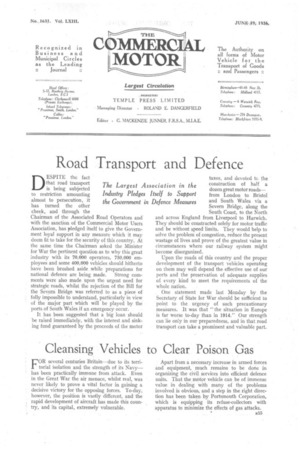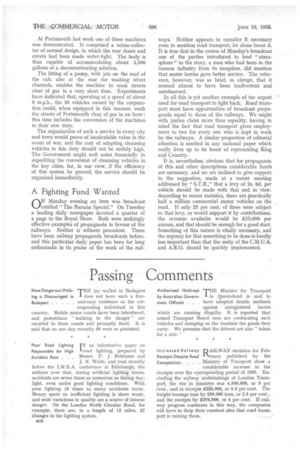Cleansing Vehicles to Clear Poison Gas
Page 25

Page 26

If you've noticed an error in this article please click here to report it so we can fix it.
FOR several centuries Britain—due to its territorial isolation and the strength of its Navy— has been practically immune from attack. Even in the Great War the air menace, whilst real, was never likely to prove a vital factor in gaining a decisive victory for the opposing forces. To-day, however, the position is vastly different, and the rapid development of aircraft has made this country, and its capital, extremely vulnerable. Apart from a necessary increase in armed forces and equipment, much remains to be done in organizing the civil services into efficient defence units. That the motor vehicle can be of immense value in dealing with many of the problems involved is obvious, and a step in the right direction has been taken by Portsmouth Corporation, which is equipping its refuse-collectors with apparatus to minimize the effects of gas attacks. At Portsmouth last week one of these machines was demonstrated. It comprised a refuse-collector of normal design, in which the rear doors and covers had been made water-tight. The body is thus capable of accommodating about 1,500 gallons of a decontaminating solution.
The fitting of a pump, with jets on the roof of the cab, also at the rear for washing street channels, enables the machine to wash streets clear of gas in a very short time. Experiments have indicated that, operating at a speed of about 8 m.p.h., the 30 vehicles owned by the corporation could, when equipped in this manner, wash the streets of Portsmouth clear of gas in an hour ; this time includes the conversion of the machines to their new duty.
The organization of such a service in every city and town would prove of incalculable value in the event of war, and the cost of adapting cleansing vehicles to this duty should not be unduly high. The Government might well assist financially in expediting the conversion of cleansing vehicles in the key cities, for, in our view, if the efficiency of this system be proved, the service should be organized immediately.
A Fighting Fund Wanted
ON Monday evening an item was broadcast entitled "The Banana Special." On Tuesday a leading daily newspaper devoted a quarter of a page to the Royal Show. Both were strikingly effective examples of propaganda in favour of the railways. Neither is without precedent. There have been railway propaganda broadcasts before, and this particular daily paper has been for long enthusiastic in its praise of the work of the rail ways.Neither appears to consider it necessary even to mention road transport, let alone boost it It is true that in the course of Monday's broadcast one of the parties introduced to lend " atmosphere " to the story, a man who had been in the banana industry from its inception, did mention that motor lorries gave better service. The reference, however, was so brief, so abrupt, that it seemed almost to have been inadvertent and unrehearsed.
In all this is yet another example of the urgent need for road transport to fight back. Road transport must have opportunities of broadcast propaganda equal to those of the railways. We might with justice claim more than equality, having in mind the fact that road transport gives employment to two for every one who is kept in work by the railways. A similar proportion of editorial attention is merited in any national paper which really lives up to its boast of representing King and Country.
It is, nevertheless, obvious that for propaganda of this and other descriptions considerable funds are necessary, and we are inclined to give support to the suggestion, made at a recent meeting addressed by " S.T.R.," that a levy of 2s. 6d. per vehicle should be made with that end in view. According to recent statistics, there are practically half a million commercial motor vehicles on the road. If only 25 per cent, of these were subject to that levy, or would support it by contributions, the revenue available would be £15,000 per annum, and that should be enough for a good start. Something of this nature is vitally necessary, and the urgency for that something to be done is hardly less important than that the unity of the C.M.U.A. and A.R.O. should be quickly implemented.




















































































